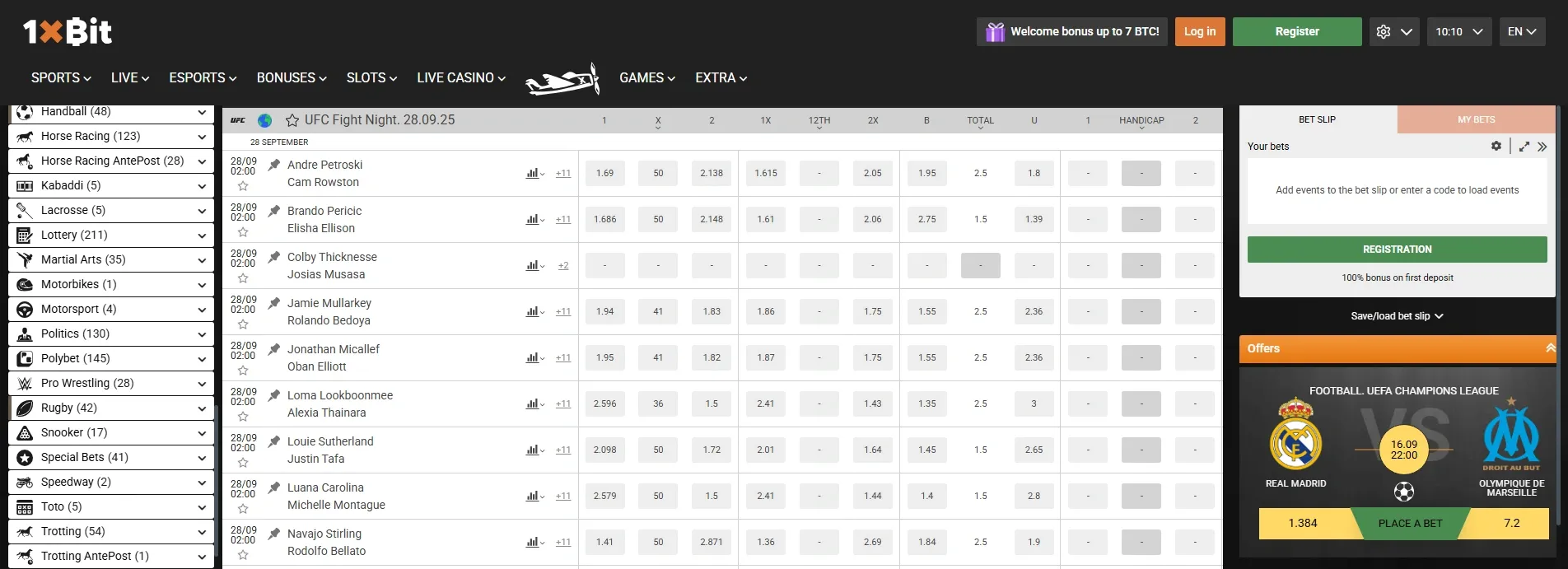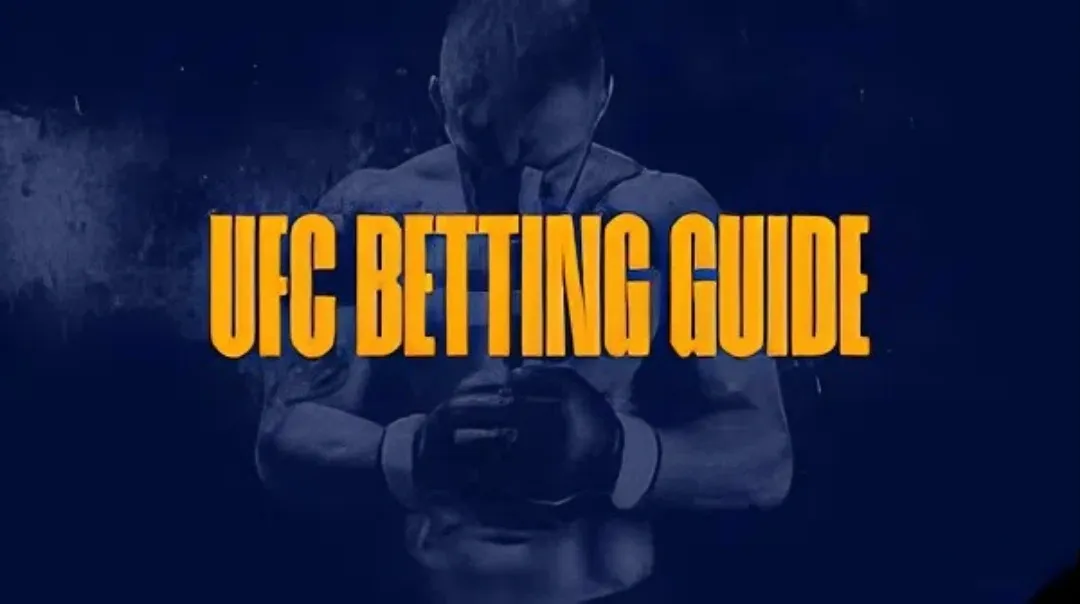UFC Betting Guide: How to Bet on UFC Fights

Mixed martial arts (MMA) has exploded in popularity, and the UFC is at the heart of this growth. It is the most recognized MMA organization in the world, hosting top fighters across multiple weight divisions. Every event attracts millions of fans, making it a perfect arena for betting enthusiasts. The speed, unpredictability, and variety of fight outcomes keep bettors on the edge of their seats.
This UFC betting guide shows you step-by-step how to wager on UFC events, read odds, and bet more effectively. You will learn about the different markets, key strategies, and how to manage your deposits and withdrawals. Whether you are new to MMA wagering or already have experience, this guide will give you the tools to make more informed decisions.
How to Place Bets on UFC

Before placing a wager, it helps to understand the sport’s flow and rules. Despite varied training origins, the Octagon consistently rewards accurate striking, strategic takedowns, and mat dominance. A bout can be booked for three rounds or five rounds for main events and title fights. The structure is simple, and that clarity helps new bettors learn faster.
A short step-by-step shows how to bet on UFC from start to finish:
- Pick a regulated sportsbook and compare its markets and limits.
- Create an account, complete identity checks, and set deposit limits.
- Add funds using a trusted payment option.
- Check the schedule and shortlist fights worth studying.
- Read the markets: moneyline, totals, and props.
- Confirm the stake, place the bet, and record it for review.
Licensed brands publish rules, settle bets on time, and handle payments securely. Many comparison sites list the best UFC betting sites; using those lists speeds up the search for safe operators. Most platforms also offer live betting for quick reactions during rounds, but even live plays benefit from a plan. A clear process protects the bankroll and makes it easier to bet on UFC only when the numbers make sense.
UFC Betting Odds Explained
Reading prices is the foundation of every pick. Here is UFC betting odds explained in plain terms. When using American odds, a minus means the favorite, and a plus points to the underdog. A line of -200 means staking 200 to win 100 in profit. A line of +150 means staking 100 to win 150 in profit. These prices encode the implied chance that a side wins. Learning to convert odds to chance allows quick comparisons with personal estimates. That comparison drives every decision on value.
Odds move for clear reasons. Sharp early money can correct an opener. Public money often follows famous names and knockout artists. Late news on injuries, travel, or rough weight cuts can swing a price on fight week. Noting down opening and closing moves helps spot patterns unique to various gyms and disciplines. Reading UFC betting odds accurately and tracking movement keeps emotion out of the process.
Total Rounds
Totals focus on how long the fight lasts. Books often set lines around 1.5 or 2.5 rounds for three-round fights and 3.5 or 4.5 rounds for five-round main events. The bet boils down to one thing: over or under the given line. Style study drives this market. Fast starters with knockout power often push unders. Kickboxers who play it safe and wrestlers who grind for control often lead to over outcomes.
Scoring matters when fights go the distance. Judges use the 10-point must system: most rounds are 10-9, and rare dominant rounds can be 10-8. The ideas behind how does UFC scoring work and how are UFC fights scored are straightforward: effective striking and grappling take priority, then aggression and control break close ties. Clean damage lands first in the order of importance. A late takedown without damage often loses to steady, hard strikes earlier in the round. Clear understanding of this structure prevents confusion when totals depend on judges’ cards.
Victory Method Props
Outcome markets let bettors predict how the fight ends. This is the heart of UFC prop bets, and it rewards focused tape study.
- KO/TKO/DQ: the referee stops the fight due to strikes or a foul.
- Submission: a choke or joint lock forces a tap or renders a fighter unable to continue.
- Decision: judges’ scorecards select the winner after time expires.
- No Contest: a result is voided due to certain fouls or events outside the fighters’ control.
The phrase what is nc in UFC means “no contest.” Accidental fouls before a cutoff, failed tests announced after a bout, or other external factors can cause this ruling. Props price in fighter tendencies, so heavy punchers against hittable opponents lean toward KO/TKO, while elite grapplers facing weak defensive grapplers lean toward submissions. Method markets often carry bigger payouts, but they still demand strict staking to manage variance.
Strategies and Tips for UFC Betting

A lack of planning at the sportsbook usually ends in a busted bankroll. Focused on research and logic, these UFC betting tips aim to improve your betting accuracy.
Tip 1: Evaluating Fighting Styles
A clear view of how does UFC work guides every matchup read. Fighters blend striking, wrestling, and submissions in different proportions. Range kickers and jab-heavy boxers win by controlling space. Pressure wrestlers win by cage clinches, trips, doubles, and control time. Scrambly grapplers win by transitions, back takes, and chain submissions. Tape answers simple questions about mechanics, not opinions: does the striker circle off the fence or back straight up; does the wrestler finish singles against opponents with solid whizzers; does the fighter maintain dominant positions or gamble on flashy, low-percentage submissions.
Useful style notes:
- Stance: orthodox vs. southpaw affects angles and open-side kicks.
- Defense: head movement, guard, and leg-kick checks matter over three rounds.
- Entries: level changes on time, feints that draw reactions, and footwork that creates lanes.
- Gas tank: steady pace across minutes without big drops.
- Adjustments: tactical changes made after a tough round to regain control.
Small details stack up. Technical fighters who slip out on angles, jab cleverly, and control space often impress judges in less obvious ways. Those edges repeat across minutes and build winning cards.
Tip 2: Analyzing Records and MMA Comparisons
Records show more than wins and losses. Look for:
- Finishing rate (how often they win by KO or submission)
- Loss patterns (e.g., struggles against wrestlers)
- Recent competition level
Comparing shared opponents can also be insightful, though MMA math isn’t perfect. A fighter may lose to someone their opponent beat, but styles can create completely different results.
For UFC betting tips, go deeper than just numbers. Study fight footage to see if victories came from skill or opponent mistakes. Consider if a fighter’s wins were over declining athletes or top contenders in their prime. Check whether their losses were competitive or one-sided. An experienced bettor will also weigh how quickly a fighter rebounds from a defeat, as mental resilience plays a huge role in future performance.
Tip 3: Considering Ring Rust, Injuries, and Knockouts
Long layoffs often dull timing and slow reactions. Fighters who stay in hard training handle returns better than those who step away. Injury history matters; knee, shoulder, and neck issues can reduce movement and power. Taking repeated knockouts usually means a fighter’s durability is slipping, making them a bigger risk. These patterns appear on film: slower recoveries, shaky legs after lighter shots, and late-fight fades.
Practical checks:
- Time since last bout and the quality of the return opponent.
- Injury reports, post-surgery updates, and signs like scars or taped joints.
- Knockout history and the time between stoppage losses.
- Pace drops in the last minute of rounds.
- Coach comments on focus areas for camp.
Small red flags do not force fades on their own, yet they change risk tolerance and stake size. Plays that once looked like full units can drop to half units or passes when health concerns stack up.
Tip 4: Factoring in Weight and Reach
A fighter’s weight cut can influence stamina. Severe cuts may cause them to gas out quickly. Reach advantages allow fighters to land strikes while staying out of danger. In close matchups, a small reach difference can decide the outcome, especially in striking battles.
In UFC betting odds, oddsmakers often account for physical advantages, but they don’t always weigh them heavily enough. A fighter with a longer reach can control distance, score points, and frustrate shorter opponents. On the other hand, a poor weight cut can nullify these benefits, making them sluggish and less durable. Look for weigh-in footage — if a fighter appears drained or struggles to make weight, their performance might suffer. Analyzing both reach and conditioning often highlights overlooked underdog value.
UFC Betting Guide: Managing Deposits and Withdrawals

Clean banking keeps attention on analysis instead of logistics. Most platforms handle payments quickly, and the process follows a regular path.
- Register an account and complete KYC checks.
- Set deposit limits to control spend.
- Choose a payment method that fits fees and speed.
- Confirm the amount and verify the transaction.
- Plan withdrawals on the same channel when possible.
Cards, e-wallets, and bank transfers cover most needs. Some brands also support crypto where allowed, which can settle fast. Always read rules on minimums, verification, and payout timelines. A reliable UFC betting app improves this flow by sending alerts on settlements and keeping cashier tools easy to reach.
UFC Betting Guide: Exploiting Bonuses and Rewards
Promotions add value when used within a plan. Checking UFC betting splits and special UFC event offers can help you find value. Welcome offers grow a starting bankroll, reloads help during busy fight weeks, and cashback softens losing streaks. Free bets suit plus-money sides because only the profit returns. Terms, playthrough, and time limits decide real value, so reading the fine print matters more than bright banners.
A simple approach keeps bonuses helpful:
- Accept offers that fit normal stake sizes and markets.
- Avoid promos that force parlays with too many legs.
- Use free bets on underdogs backed by research.
- Track playthrough to avoid deadline stress.
- Keep screenshots of terms for easy reference.
The aim is to support good wagers, not to chase volume for the sake of clearing a bonus.
FAQ
Use regulated online sportsbooks in your region. Pick brands with clear rules, competitive prices, fast payouts, and solid responsible-gambling tools.
Depends on local law. Bet only with operators licensed in your country or state and verify the license in the site footer or regulator register.
Oddsmakers set opening lines from fighter skills, styles, and results; prices then move based on market action, injuries, camp news, and weigh-in updates.
Choose reputable platforms that post full cards, offer live markets, support secure payments, and process withdrawals quickly; mobile-friendly sites make fight-week upkeep easier.

Sergey Ilyin
An experienced specialist in the field of betting and gambling. He analyzes market trends, player behavior, and the dynamics of online gaming platform development. An expert in the intricacies of sports betting and knowledgeable about the regulatory framework of the gambling industry.
